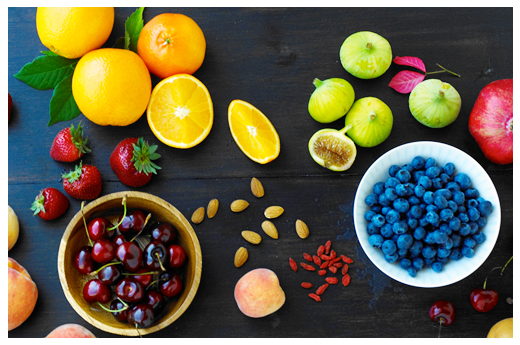 by David Grotto, RD, author of The Best Things You Can Eat
by David Grotto, RD, author of The Best Things You Can Eat
The Centers for Disease Control and Prevention (CDC) now considers our lack of sleep a “public health epidemic.” Currently, Americans spend more than $84 million on over-the-counter sleep aids each year, leaving many searching for natural, cost-effective ways to help manage their sleep deficit. So, what’s keeping everybody up?
Lack of sleep can be influenced by many factors, from medical illness to side effects of drugs to simply having a lot on your mind. Before trying to remedy your sleep deficit on your own, make sure you investigate whatever might be behind your sleep difficulties and seek proper professional attention. Doing so could save you time, money, and many more sleepless nights.
Prescription and over-the- counter sleep aids unfortunately don’t address the root cause of a sleep disorder. They are a temporary fix until the driving force behind the problem can be addressed. Diet and lifestyle changes may be a natural alternative worthy of discussing with your doc. The types of food and beverages you choose and the way that you consume them can play a major role in influencing sleep.
First, here are a few tips on how to make a bedtime snack really work for you:
- Time your snack. Research suggests that bedtime snacks are most effective when they happen an hour before bedtime (not sooner) and contain carbohydrates plus a little protein. A small nutrient-balanced snack causes the brain to produce serotonin, which helps calm and prepare you for sleep.
- Plan an early bedtime. Short sleep times can cause an imbalance of the hormones leptin and ghrelin; this imbalance increases hunger and decreases satiety cues. What does that mean? It means not getting enough sleep every night can cause you to eat more and feel hungrier, which can make it difficult for you to fall asleep. So, eat a small snack around 9:00 and try to be in bed by 10:00.
- Avoid caffeine and alcohol after 7. Caffeine works as a mild stimulant that causes jitters and gets the brain working into overdrive. If you must have caffeine, make sure you have it no sooner than two to three hours before bedtime. Foods and beverages that contain the most caffeine include coffee, green and black tea, energy drinks, caffeinated sodas like cola and root beer, and chocolate. And research shows that while a drink or two may help you get to sleep, alcohol is disruptive of restful REM (rapid eye movement) sleep.
With those tips in mind, here’s what to chew to help you snooze:
1. Cherries are one of the top foods rich in naturally occurring melatonin, a hormone that promotes sleep. One study found that healthy adults experienced improved sleep time and a 5 to 6 percent increase in overall sleep efficiency after drinking two servings of tart cherry juice for a week.
2. Carbohydrates before bedtime are one of the best fuels for cranking out sleep-promoting serotonin. But don’t have fatty fries or chips. Have some warm oatmeal or two slices of whole grain toast with almond butter.
3. Milk is the largest contributor of calcium, vitamin D, and potassium to the American diet. Although the scientific literature is a bit thin on milk’s effect on sleep, the nutrients in milk—specifically calcium and tryptophan—are known to induce sleep. Calcium helps the brain use the amino acid tryptophan. Milk’s carbohydrates help tryptophan work more effectively, too!
4. Salmon is rich in omega-3 fats. Research shows that omega-3–deficient diets negatively affect the sleep hormone melatonin and its function, and throw off the natural sleep cycle called “circadian rhythm,” which can lead to sleep disturbances.
5. Chicken is naturally high in the amino acid precursor to melatonin called tryptophan. I’m sure you were thinking that turkey might have a leg up on the competition, but that’s not the case. Tryptophan helps produce the neurotransmitter serotonin, which in turn makes us feel more relaxed and sleepy.
6. Pumpkin seeds are an excellent source of the mineral magnesium, as well as an excellent source of tryptophan. Low magnesium levels have been associated with a poor night’s sleep. Eating a handful of pumpkin seeds was found to be as effective in improving tryptophan levels in the body as taking tryptophan supplements.
7. Walnuts contain a number of nutrients that support a relaxed and healthy nervous system. These include omega-3 fats, vitamin E, folate, and melatonin. Research shows that the melatonin in walnuts is well absorbed and will raise blood melatonin concentrations when eaten in moderation.
 David Grotto, RD, LDN, formerly the national spokesperson for the American Dietetic Association, he is now the founder and president of Nutrition Housecall, a nutrition consulting firm that provides nutrition communications, lecturing and consulting services, and also offers personalized at-home dietary services. He is the author of 101 Foods That Could Save Your Life and 101 Optimal Life Foods.
David Grotto, RD, LDN, formerly the national spokesperson for the American Dietetic Association, he is now the founder and president of Nutrition Housecall, a nutrition consulting firm that provides nutrition communications, lecturing and consulting services, and also offers personalized at-home dietary services. He is the author of 101 Foods That Could Save Your Life and 101 Optimal Life Foods.




Hi, Maria,
“… literature is a bit thin on milk’s affect on sleep, the nutrients in …”
It should be “milk’s EFFECT”…….
The former English teacher in me.
Have a great weekend!
Tim
Apologies, but there’s a lot of evidence that milk is not good for you. You can get calcium from many healthier foods. Full disclosure: I’m a vegan, but do some research before falling for the “Got Milk?” ads. And you can get Omega-3s from the source–algae, or vegan Omega-3 supplements. That’s where fish get theirs from (the former). If you eat turkey, please buy organic. I will keep tart cherry juice and walnuts (also Omega-3s) on hand, though.
Approx. how many walnuts would you need to eat each day ?
What about other nuts ? Dr. Oz just said yesterday, you only need to eat (1) Brazil Nut a day to get the recommended amount of Selenium that a person needs each day !